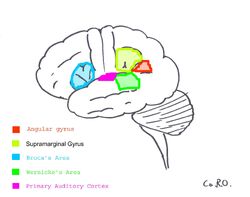No edit summary |
No edit summary |
||
| (4 intermediate revisions by the same user not shown) | |||
| Line 3: | Line 3: | ||
{{DiseaseDisorder infobox | |
{{DiseaseDisorder infobox | |
||
Name = Receptive aphasia | |
Name = Receptive aphasia | |
||
| − | Image = [[surfacegyri.jpg]] | |
+ | Image = [[Image:surfacegyri.jpg|thumb|250px]] | |
Caption = Figure one illustrates significant language areas of the [[brain]]. In [[Broca's aphasia]], the area typically lost is highlighted in blue. In Wernicke's aphasia, the area lost is highlighted in green. | |
Caption = Figure one illustrates significant language areas of the [[brain]]. In [[Broca's aphasia]], the area typically lost is highlighted in blue. In Wernicke's aphasia, the area lost is highlighted in green. | |
||
Width = 300 | |
Width = 300 | |
||
| Line 16: | Line 16: | ||
}} |
}} |
||
{{Boxbottom}} |
{{Boxbottom}} |
||
| + | |||
| ⚫ | '''Receptive aphasia''', also known as '''Wernicke's aphasia,''' '''fluent aphasia,''' or '''sensory aphasia''' in [[clinical neuropsychology]] and [[cognitive neuropsychology]], is a type of [[aphasia]] often (but not always) caused by neurological damage to [[Wernicke's area]] in the brain (Brodman Area 22, in the posterior part of the superior temporal gyrus of the dominant hemisphere). |
||
| + | {{Main|Aphasia}} |
||
| + | |||
| + | |||
| ⚫ | '''Receptive aphasia''', also known as '''Wernicke's aphasia,''' '''fluent aphasia,''', '''logagnosia''' or '''sensory aphasia''' in [[clinical neuropsychology]] and [[cognitive neuropsychology]], is a type of [[aphasia]] often (but not always) caused by neurological damage to [[Wernicke's area]] in the brain (Brodman Area 22, in the posterior part of the superior temporal gyrus of the dominant hemisphere). If Wernicke's area is damaged in the non-dominant hemisphere, the syndrome resulting will be sensory [[dysprosody]] - the lack of ability to perceive the pitch, rhythm, and emotional tone of speech. |
||
| + | |||
| + | This is not to be confused with [[Wernicke's encephalopathy]] or the [[Wernicke-Korsakoff syndrome]]. |
||
[[Speech]] is preserved but [[language]] content is incorrect. This may vary from the insertion of a few incorrect or nonexistent words to a profuse outpouring of jargon. Rate, intonation and stress are normal. Substitutions of one word for another (e.g. "telephone" for "television") are common. [[Comprehension]] and repetition are poor. |
[[Speech]] is preserved but [[language]] content is incorrect. This may vary from the insertion of a few incorrect or nonexistent words to a profuse outpouring of jargon. Rate, intonation and stress are normal. Substitutions of one word for another (e.g. "telephone" for "television") are common. [[Comprehension]] and repetition are poor. |
||
| + | |||
| + | |||
Example: |
Example: |
||
| Line 27: | Line 35: | ||
Patients who recover from Wernicke's aphasia report that while aphasic they found the speech of others to be unintelligible, and even though they knew they were speaking, they could neither stop themselves nor understand what they had just said. |
Patients who recover from Wernicke's aphasia report that while aphasic they found the speech of others to be unintelligible, and even though they knew they were speaking, they could neither stop themselves nor understand what they had just said. |
||
| + | In terms of reading the person can see and read words but not identify them in terms of their meaning. |
||
| − | |||
== See also == |
== See also == |
||
Latest revision as of 22:55, 26 January 2009
Assessment |
Biopsychology |
Comparative |
Cognitive |
Developmental |
Language |
Individual differences |
Personality |
Philosophy |
Social |
Methods |
Statistics |
Clinical |
Educational |
Industrial |
Professional items |
World psychology |
Clinical: Approaches · Group therapy · Techniques · Types of problem · Areas of specialism · Taxonomies · Therapeutic issues · Modes of delivery · Model translation project · Personal experiences ·

| |||||||||||||||
- Main article: Aphasia
Receptive aphasia, also known as Wernicke's aphasia, fluent aphasia,, logagnosia or sensory aphasia in clinical neuropsychology and cognitive neuropsychology, is a type of aphasia often (but not always) caused by neurological damage to Wernicke's area in the brain (Brodman Area 22, in the posterior part of the superior temporal gyrus of the dominant hemisphere). If Wernicke's area is damaged in the non-dominant hemisphere, the syndrome resulting will be sensory dysprosody - the lack of ability to perceive the pitch, rhythm, and emotional tone of speech.
This is not to be confused with Wernicke's encephalopathy or the Wernicke-Korsakoff syndrome.
Speech is preserved but language content is incorrect. This may vary from the insertion of a few incorrect or nonexistent words to a profuse outpouring of jargon. Rate, intonation and stress are normal. Substitutions of one word for another (e.g. "telephone" for "television") are common. Comprehension and repetition are poor.
Example:
- I called my mother on the television and did not understand the door. It was too breakfast, but they came from far to near. My mother is not too old for me to be young.
If excessive, this may be confused with the psychiatric signs of "pressure of speech" and "word salad".
Patients who recover from Wernicke's aphasia report that while aphasic they found the speech of others to be unintelligible, and even though they knew they were speaking, they could neither stop themselves nor understand what they had just said.
In terms of reading the person can see and read words but not identify them in terms of their meaning.
See also
References & Bibliography
Key texts
Books
Papers
Additional material
Books
Papers
External links
| This page uses Creative Commons Licensed content from Wikipedia (view authors). |